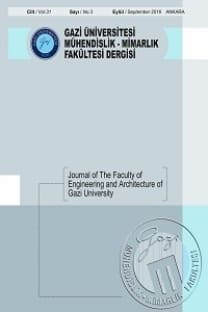Kontrol sistemlerinde belirsizlikle baş etme yöntemleri: Lyapunov tarzı yaklaşımlar
Dealing with uncertainty in dynamical systems: Lyapunov-based approaches
___
- 1. Maxwell, J. C., “On Governors”, Proc. Royal Soc. London, Vol. 16, 270-283, 1868.
- 2. Routh, E. J., A Treatise on the Stability of a Given State of Motion, London: Macmillan & Co., 1877.
- 3. Vishnegradsky, I. A., On Controllers of Direct Action, Izv. SPB Technology Inst., 1877.
- 4. Lewis, F. L., Applied Optimal Control and Estimation, Prentice-Hall, 1992.
- 5. Hurtwitz, A., “On the Conditions under Which an Equation Has Only Roots with Negative Real Parts”, Mathematics Annalen, Vol. 46, 273-284, 1895.
- 6. Lyapunov, M. A. “Problémé général de la stabibilité du movement”, Ann. Fac. Sci. Toulouse, Vol. 9, 2003-474, 1907. (Orijinal yayın Rusça olarak 1892’de Comm.Soc. Math. Kharkow da ve daha sonra Ann.Math. Studies, Vol. 17, Princeton University Press, Princeton, N.J. 1949’da basılmıştır.)
- 7. Sandberg, I. W., “A Frequency-Domain Condition for the Stability of Feedback Systems Containing a Single Time-Varying Nonlinear Element”, Bell Syst. Tech. J., Vol. 43, No.4, 1601-1608, 1964.
- 8. Zames, G., “On the Input-Output Stability of Time- Varying Nonlinear Feedback Systems, Part II: Conditions Involving Circles in the Frequency Plane and Sector Nonlineraties”, IEEE Trans. Automatic Control, Vol.AC-11, No.3, 465-476, 1966.
- 9. Desoer, C.A., “A Generalization of the Poopov Criterion”, IEEE Trans. Autom. Control, Vol. AC-10, No.2, 182-185, 1965.
- 10. Popov, V. M., “Absolute Stability of Nonlinear Systems of Automatic Control”, Automat. Remote Control, Vol. 22, No.8, 857-875, 1961.
- 11. Yesildirek, A., Lewis, F. L., “Feedback Linearization Using Neural Network”, Automatica, Vol. 31, No.11, 1659-1664, 1995.
- 12. de Queiroz, M. S., Dawson, D. M., Nagarkatti, S. ve Zhang, F., Lyapunov-Based Control ofMechanical Systems, ISBN 0-8176-4086-X, Boston Birkhäuser, 2000.
- 13. Krstiċ, M., Kanellakopoulos, I., ve Kokotoviċ, P. , Nonlinear and Adaptive Control Design, New York, NY: Willey Interscience, 1995.
- 14. Slotine, J. J. and Li, W. Applied Nonlinear Control, Englewood Cliff, NJ: Prentice Hall, 1991.
- 15. Arimoto, S., Kawamura, S. and Miyazaki, F., “Bettering Operation of Robots by Learning”, J. Robot. Syst., Vol. 1, No.2, 123-140, 1984.
- 16. Lewis, F., Abdallah, C., ve Dawson, D. M. ,Control of Robot Manipulators, Newyork: MacMillan Publishing Co., 1993.
- 17. Dixon, W. E., Zergeroğlu, E., Dawson, D. M. ve Costic, B., “Repetitive Learning Control: A Lyapunov-Based Approach”, IEEE Trans. on Systems, Man, and Cybernetics-Part B: Cybernetics, Vol. 32, No.4, 2002.
- 18. Xian, B., Queiroz, M. S. ve Dawson, D. M., A Continuous Control Mechanism for Uncertain Nonlinear Systems, Optimal Control, Stabilization and Nonsmooth Analysis, Lecture Notes in Control and Information Sciences, Heidelberg, Almanya: Springer-Verlag, Basım Aşamasında, 2004.
- ISSN: 1300-1884
- Yayın Aralığı: 4
- Başlangıç: 1986
- Yayıncı: Oğuzhan YILMAZ
PAMUK GABARDİN KUMAŞLARDA DİKİŞ RANDIMANI VE KAYMASI
KARADENİZ’DE UNUTULAN ENDÜSTRİ MİRASI
Yerçekimine ters döküm yönteminin döküm parçaların besleme özelliklerine etkileri
YERÇEKİMİNE TERS DÖKÜM YÖNTEMİNİN DÖKÜM PARÇALARIN BESLEME ÖZELLİKLERİNE ETKİLERİ
YAKMA ALIN KAYNAĞI İLE KAYNATILMIŞ İKİ FARKLI ÇELİĞİN KAYNAK KALİTESİNE YIĞMA AKIM ZAMANININ ETKİSİ
Cemil ÇETİNKAYA, Uğur ARABACI, Ali AKAY
Klasik bir torna tezgahı icin bilgisayar kontrollu profil tornalama sistemi geliştirilmesi
Ömer KELEŞ, Yusuf USTA, Yücel ERCAN, Y. Yücel YEŞİLBAĞ
Karadeniz ' de unutulan endüstri mirası
Yüksek sıcaklığın silis dumanı ve süperakışkanlaştırıcı katkılı hafif betona etkileri
